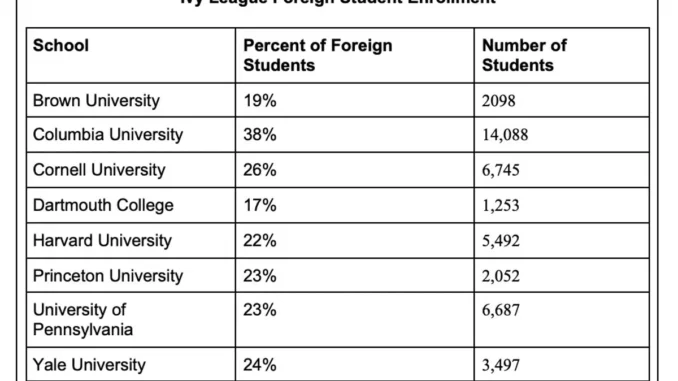A massive increase in foreign money and students on American campuses is driving radicalization and subsidizing institutional failure
By Nedetu Arnold, TABLET FEB 27, 2024
Students participate in a protest in support of Palestine on the Columbia University campus on November 14, 2023 in New York City.
Something new and peculiar stands out about the wave of anti-Israel student activism that has rocked American university campuses since October: There is a visibly more radical element to these protests. Student activists almost seemed to take glee in Hamas’ massacre of innocent civilians—when they weren’t denying that it happened at all. The antisemitic rage struck a different tone than the typical anti-Israel fare that has become a central part of American student activism since Students for a Democratic Society formed in the 1960s.
So what changed? The answer is clear to anyone who watched the videos: these student protests are no longer composed solely of left-wing American students steeped in critical theory and post-colonial ideology. The protests are now havens for foreign students, especially those from Arab and Muslim countries, with their own set of nationalist and tribal grievances against Israel and the United States. In some cases, such foreign students appear to lead the protests in their pro-terrorism chants—some of which are in Arabic, or translations of Arabic slogans.
What we are witnessing is the latest consequence of a quiet revolution in higher education: the internationalization of the American university. Today, there are more than one million foreign students enrolled at American universities, making up more than 5% of the total student population. At elite universities, the situation is much more extreme: international students make up almost 25% of the student population.
The process of internationalization was slow at first, but it has rapidly accelerated in the past two decades. Since the Institute of International Education started to keep track of foreign student enrollment in 1948, it took over 50 years for enrollment to increase from 25,000 to more than 500,000 by 2000. But it only took 15 years after that for the number of international students to double to its current level of one million.
The motivations of universities to admit so many international students are two-fold. Foreign students, first and foremost, serve as cash cows. They disproportionately pay full price for tuition and housing, whether it comes from sponsorships by foreign governments or their own families’ largesse. The deal is even better for public universities—international students pay the out-of-state price, which is significantly higher than the tuition rate for in-state students.
Increasing international student enrollment also fits neatly into universities’ diversity, equity, and inclusion (DEI) goals. While this particular phenomenon is more recent, it is crucial for understanding the current shifts in international student recruitment. It also provides universities with a moral justification for their equivocating response to egregious—and perhaps even illegal—acts by international students in recent months.
Neetu Arnold is a Research Fellow at the National Association of Scholars and a Fellow with Young Voices. Follow her on X @neetu_arnold





FELIX-
I Know Alan Shatter as he is a senior partner in my former firm of Irish Solicitors, who lost me an “open and shut” case of an admittedly drunken driver, who destroyed my parked car whilst myself and my very young children were in it, causing me life-lasting injuries… Hard to believe. Took 26 years before I gave up in disgust. And they got their “fees”. We were lucky not to have all been either killed or seriously maimed.
Not surprising that he doesn’t understand much. All he understands is Irish Law., and I’m not sure of how much of THAT.
Whilst he was Minister of Defence for a few Years, for Irelands militarily inept tiny army he knows as much about military matters as of harpooning whales.
The fictional Moby Dick he ain’t.
The cities tell the tale
White Brits on London are in the minority. Has happened over 20 years only.
https://www.bbc.com/news/uk-21511904
Alan Shatter a former Irish government minister on twitter
Alan Shatter has made a big mistake. Strange as it may seem he does not understand AT ALL the history of the holocaust in Ukraine and that 2 forces were operating 1. The Arab Palestine fascist Haj Amin el Husseini in Yugoslavia 2. Stepan Bandera in Ukraine. Both criminals part of Holocaust …
https://twitter.com/Alan__Shatter/status/1762077756710334583?t=02v-lY-Gq7-IptVzuJmrrA&s=19